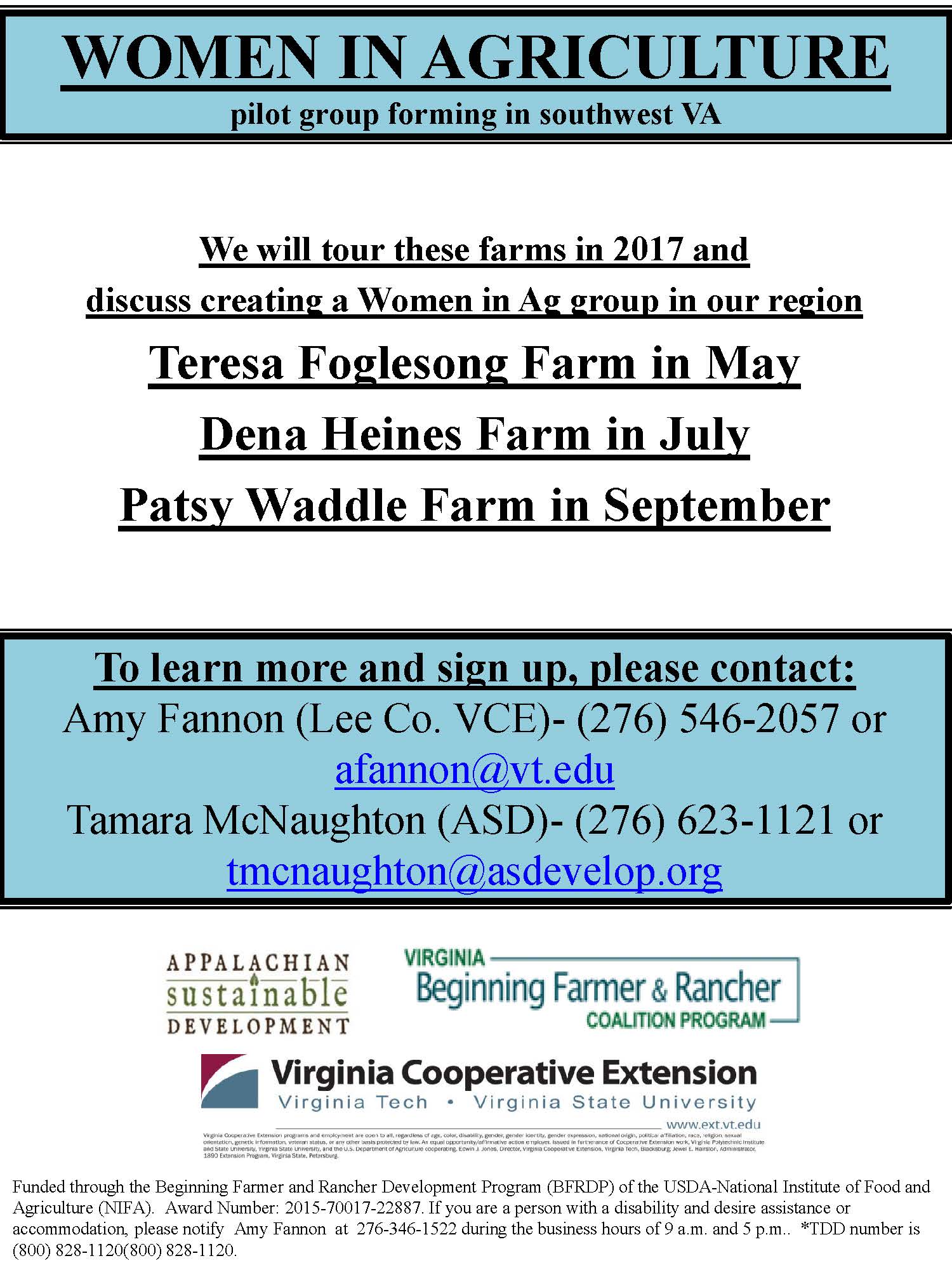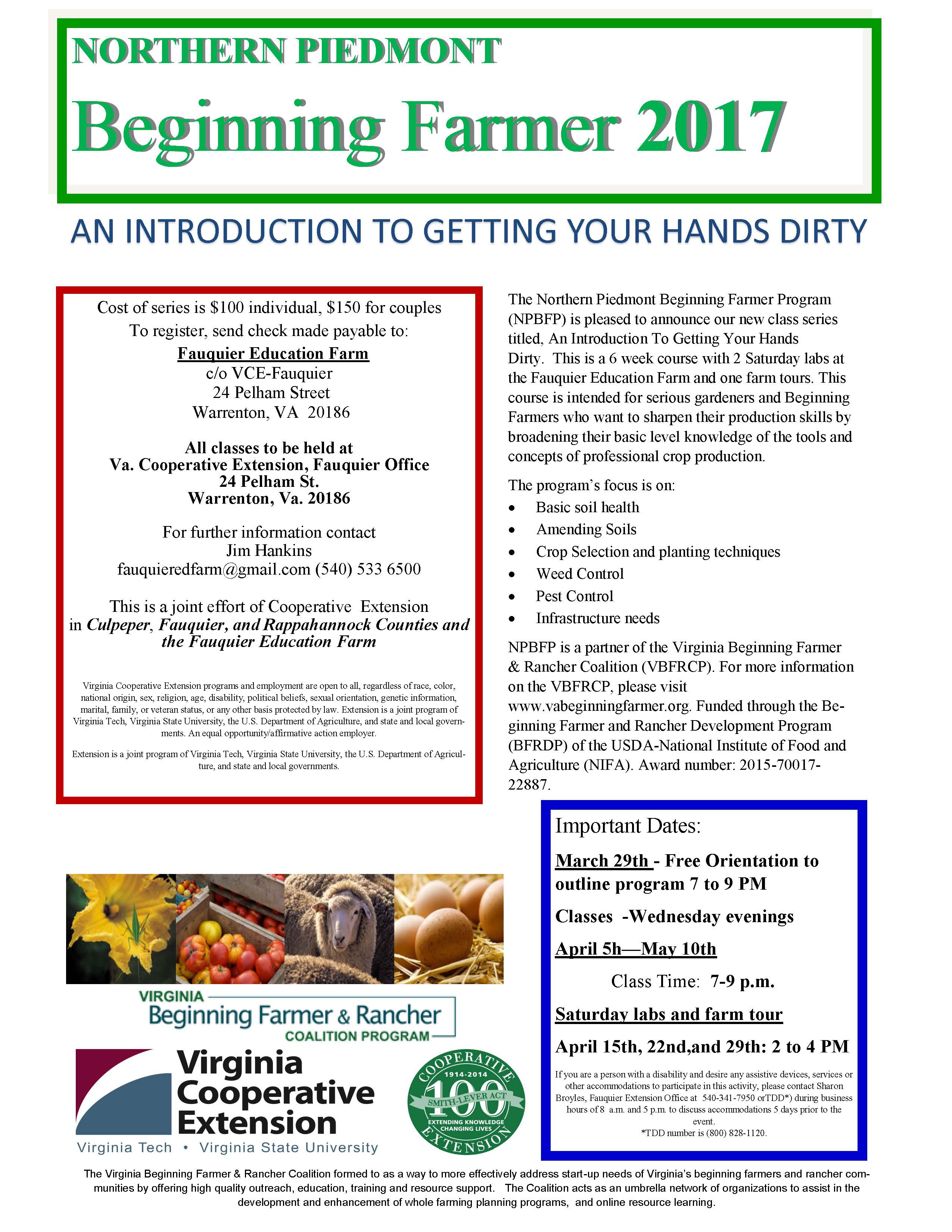
In December 2016, the Virginia Beginning Farmer & Rancher Coalition (VBFRC) disseminated $20,000 of mini-grant funds to Coalition partner organizations for six 2017 programming opportunities aimed at supporting the next generation of farmers and ranchers in Virginia. These mini-grant funds are meant to assist VBFRC organizations in supporting the goals of the Coalition while increasing their capacity to either initiate new or enhance existing programming projects designed to support place-based and culturally-appropriate education, training, and networking opportunities for Virginia’s beginning farmers. Funds support expenses directly related to the implementation of the project such as travel expenses, human resources, and educational related materials.
Mini-grant projects illustrate new and enhanced programming opportunities to be implemented across the Commonwealth in 2017. These projects reflect a number of capacity building and farmer-led approaches. Topics these projects address include: youth education; women in agriculture; building farm skills and experience; training resources for low-literacy farmers; farmland access; and micro-dairy farming.
Projects funded by the 2016-2017 VBFRC mini-grants are listed below.
Agriberry Farm and Community Food Collaborative
Creating Innovative Conduits of Opportunity: Connecting beginning rural farmers and urban-dwelling potential farmers to expanded opportunities in networking for fresh fruit education and outreach partnerships
Anne Geyer, agriberry@gmail.com
Project Description: This project is a unique pilot program that aligns the missions of multiple nontraditional institutional partners with the overarching goal of cultivating a set of practical knowledge and skills among beginning farmers while conducting educational outreach with prospective urban-dwelling new farmers. The proposed partnership uses a nested teaching and learning model that guides two beginning farmers through a process of on-farm training, directed research, product innovation, and youth education. The partnership will address three key community identified needs while indirectly addressing the national demand for increased fruit production: 1) hands on, real world experience for beginning farmers 2) closer rural-urban farming connections 3) more replicable programs and activities connecting underserved youth to education and opportunities in agriculture.
Through this pilot program, Agriberry will apply their many years of accumulated knowledge and experience in rural farming to mentor and enhance two beginning berry farmers. In addition to their on-farm mentorship experience, the selected beginning farmers--an African American man and a caucasian woman--will conduct research in, and create prototype designs of farm scale vermicompost and vertical strawberry production systems. These beginning farmers will, in turn, work with Community Food Collaborative and their educational partners to apply their research and experience by creating a series of lessons and activities that connect vermicompost and strawberry production to Virginia Standard of Learning (SOL) targets. The pilot program will culminate in the development of an agricultural education and career opportunity conduit by providing experience and exposure in agriculture to urban youth who otherwise would not have access to such opportunities.
Appalachian Sustainable Development and Virginia Cooperative Extension (Lee Office)
Piloting Women in Ag Group with Farm Tour s and Learning Sessions
Tamara McNaughton, tmcnaughton@asdevelop.org
Project Description: The goal of this project is to pilot a Women in Ag group using three farm tours with mini learning sessions and a financial planning workshop focused on QuickBooks to gauge interest in maintaining such a women in ag group in far southwest Virginia. The farm tours will take place on woman operated farms in order to create space where women farmers can learn and share together. A financial planning workshop introducing QuickBooks as a tool for strengthening whole farm management skills will be offered and open to all interested farmers and ranchers. The pilot will be used to engage women farmers in conversation about developing and continuing such a group for the long term.
Fauquier Education Farm and Virginia Cooperative Extension (Fauquier Office)
An Introduction to Getting Your Hands Dirty
Jim Hankins, fauquieredfarm@gmail.com
Project Description: The number of people expressing interest in and attending Beginning Farmer trainings in the Northern Piedmont region of Virginia is very strong. This is a widely diverse group of individuals from an equally diverse range of backgrounds who are all expressing a desire for assistance to learn about how they can start a farming enterprise. These aspiring new farmers range from young people just starting a career to a great many landowners, both fully employed and retired who are looking for ways to put their property to work to create some income. Many of these aspiring farmers want to transition to what they see as a more rewarding career in farming without a clear idea of what this involves or the risk that may be present in this transition.
Many of these people who are interested in agriculture have had little or no direct experience with farming and are often quite confused and bewildered about where to start and how to begin to learn a new language of growing crops. They often have bits and pieces of knowledge that can contradict and end up costing these new farmers both money and labor. Often times existing Extension programing is directed at active producers and passes right over the heads of these new farmers because they do not yet have a grasp of the most simple basic concepts. These are most often highly intelligent individuals who bring a wealth of valuable experience to the enterprise but are lacking basic farming skills and experience.
The Northern Piedmont Beginning Farmer and Rancher Program is offering just such a beginner level course to help guide these aspiring farmers on their journey into agriculture. Our course, An Introduction to Getting Your Hands Dirty, will be an opportunity to help save these new farmers some confusion and build a solid foundation on how crop production works.
International Rescue Committee
Financial Education for New Roots Microproducers
Elizabeth Moore, Elizabeth.Moore@rescue.org
Project Description: The IRC provides refugee farmers with the opportunity to develop agricultural microenterprises through its Microproducer Academy (MPA), which launched in 2013 under a three-year federal grant, the Refugee Agricultural Partnership Program (RAPP). The MPA training program instructs participants on all aspects of production-for-market farming in Central Virginia, and covers topics like crop planning, pest management, organic practices, recordkeeping and marketing. Participants attend additional workshops, classes and activities in English, which focus on developing other transferable employment skills (i.e. telling time, reading a table, making change). Activities and lessons are created and adapted to fit the audience of low-literacy/low-numeracy international farmers, using innovative visual tools, role playing and games.
As the New Roots microproducer program enters its fourth year, IRC staff have identified the need for additional and more specific financial and business regulation trainings and resources. Many of the New Roots microproducers have shown great progress in learning and incorporating vital agricultural practices and concepts; New Roots staff have developed greater facility to create and adapt educational resources so they are more relevant to the program’s participants. However, existing materials and resources on finance and business regulation are not easily accessible to the program’s clientele of low-literacy refugee farmers, and many existing resources do not consider local market context.
With the VBFRC mini-grant, the IRC will develop tools and resources to fill the crucial need for financial and business training, thereby expanding and strengthening New Roots Charlottesville’s strong foundation as a provider of beginning farmer training. Funding will enable NRC to create audience-specific training tools and workshops that will become part of the permanent MPA curriculum used by all MPA refugee farmers. The resulting materials will be distributed through multiple partner networks, and will help refugee farmers advance to the “next level” of experience, ability, and market access.
Piedmont Environmental Council
Facilitating Farmland Access through Farmer-Landowner “Speed- Dating”
Jessica Palmer, jpalmer@pecva.org
Project Description: The Piedmont Environmental Council (PEC) will organize two “speed-dating” events in 2017 to facilitate leasing partnerships between beginning farmers and large-lot rural landowners in Virginia’s northern and central Piedmont. These events will focus on encouraging beginning farmers to meet and discuss their business plans with as many landowners as possible within an informal setting, in order to build meaningful relationships that have a better chance of resulting in leasing partnerships.
This project builds on a farmland access initiative that PEC began 2015. During the past year PEC has organized two farmer-landowner workshops and one speed-dating event, partnering with the Farm Link and Certified Farm Seekers programs. One key learning from these events was the need to better prepare beginning farmers so they can take fuller advantage of the opportunity to connect with landowners.
PEC will hold two farmland leasing speed-dating events in 2017, targeting explorer and startup farmers. A speed-dating event focused on central Piedmont farmers and landowners will be held in the Charlottesville area, and one focused on the northern Piedmont will be held in Fauquier County.
The Fauquier event will be held in March 2017 in collaboration with Jim Hankins and the Northern Piedmont Beginning Farmer program. The event will be a two-part workshop and will be open to current and past Northern Piedmont Beginning Farmer students and any interested farmers/land seekers. In contrast, the Charlottesville speed-date will be a stand-alone event. PEC will use these two different event types to assess the value of a more hands-on model that incorporates guided land access goal development with a networking event.
Virginia Cooperative Extension (Rockbridge County)
Opportunities in Micro-Dairy Farming
Tom Stanley, Stanleyt@vt.edu
Project Description: At least two formal seminars, seven 3-hour whole-farm planning/consultation sessions, and a four-page publication on micro-dairying will be made available to current and prospective farm families in Virginia Cooperative Extension's Northern District.
The pro forma enterprise budget developed by Tom Stanley (Extension Agent, Farm Business Management), equipment information from Micro Dairy Designs, LLC (www.microdairydesigns.com), and information from Clear Spring Creamery (www.clearspringcreamery.com) will be used to empower program participants to begin the process of assessing the feasibility of starting their own micro-dairy. Extension Agents for Agriculture and Natural Resources in the counties of the VCE Northern District will be partners in Supporting the project, particularly those in Fauquier, Loudon, Warren, and Rockingham.
The Virginia Beginning Farmer & Rancher Coalition is a state-wide and coalition-based Extension program, housed in Virginia Tech’s Department of Agricultural, Leadership, and Community Education. Funding was sponsored by the Beginning Farmer and Rancher Development Program (BFRDP) of the USDA National Institute of Food and Agriculture (NIFA) Award #2017-70011-26861, and the Southern Risk Management Education Center Grant #545015. For more information about the program, contact Katie Trozzo, Program Coordinator, at vabeginningfarmer@vt.edu or 540-231-4582. For other questions, contact Kim Niewolny, Program Director, at niewolny@vt.edu.
For website updates, such as broken links, please contact vabeginningfarmer@vt.edu



